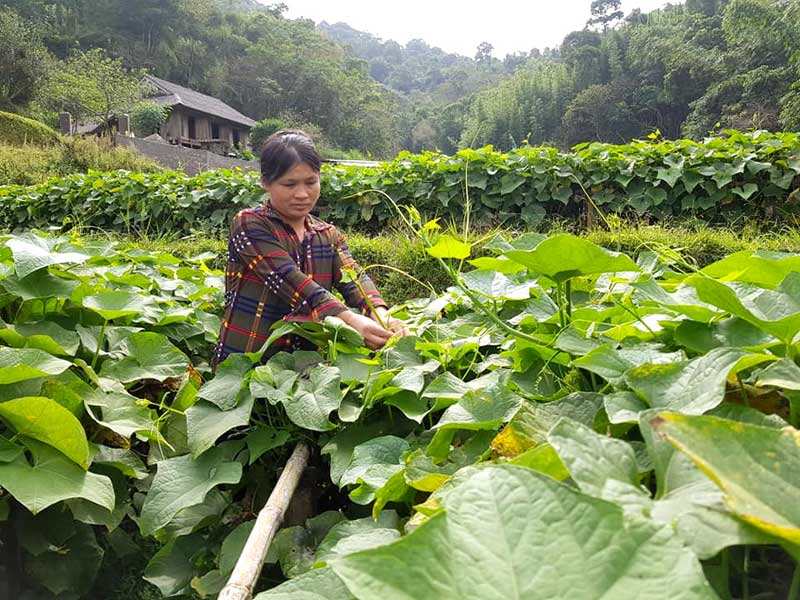
(HBO) We met Ms. Bui Thi Tuy, Lu Village, Lung Van Commune (Tan Lac) on the fair. She was always busy with the work and really impressed by the enthusiasm, diligence and thoughtfulness of the highland women who tried to escape the poverty to stabilize family life from planting chayote trees.
Today, at the fair the commune organizes a
job transaction floor, so the customers order a lot. From the early morning,
her whole family focused on cutting off the tops of the chayote trees. A lot
more other customers wanted to buy tops
of the chayote trees but there were not any left. Therefore she had to collect
tops of the chayote trees from a few families. Although customers ordered a lot,
she still carefully cut each of the green tops of vegetables, which is good for
customers. Ms. Tuy said: The entire area of the chayote trees has never been
sold in the retail market. For many years, customers have come to the gảden to buy them.

Ms. Bui Thi Tuy, Luc Village, Lung Van
Commune (Tan Lac) is harvesting the tops
of the chayote trees
Ms Tuy said: "Four years ago, my family
belonged to one of the poor households. The economy depended on growing rice,
corn and raising a few chicken. Since the commune changed the structure of
crops from poor tree planting into growing chayote trees.”Ms. Tuyet said that
the natural chayote trees adapted to the soil and climate and
they have been growing well without any care for many years. Thanks to the
broadcast media, fresh chayote vegetable in Tan Lac highland has been popular
in many places, so it is easy to sell. Cultivating chayote trees is not so
dificult with low investment capital and without much care. The trees don’t
have many pests, either. Especially, the chayote trees for tops only provides
daily harvesting and the harvest time lasts from 4 to 5 years to be replanted,
bringing the economic efficiency, which is many times higher than the other
crops. Realizing the high economic benefit, her family has focused on making
use of the available land areas to plant chayote trees. From earning a few
million dóng a month, and now her family earns an average of 10 million VND/
month from selling tops of the chayote trees.
After escaping poverty from growing chayote
trees, Ms. Tuy's family has accumulated some capital to invest in raising pigs
and chicken in the direction of goods. Each year, her family earns about 200
million VND.
Since the beginning of this year, under the direction of the Department of Agriculture and Environment, the Sub-Department of Agricultural, Forestry, and Fishery Product Quality Management has strengthened the integration of the professional activities to promote and guide the organizations and individuals in the production and trading of agricultural, forestry, and fishery products to comply with the legal regulations regarding the use of chemicals, pesticides and veterinary medicines in crop cultivation, livestock farming and aquaculture. They also provide guidance to processing and manufacturing establishments on keeping the records to trace the product origins and using food additives from the approved list according to the regulations.
Hoa Binh province saw a significant rise in state budget revenue in the first two months of 2025, heard a meeting chaired by Vice Chairman of the provincial People’s Committee Quach Tat Liem.
Ha Thi Ha Chi, a 26-year-old graduate in law, has taken an unconventional path by returning to her hometown in Mai Chau district to establish the Tong Dau Cooperative, creating stable jobs for local women and bringing Thai ethnic brocade weaving to the global market.
As the Lunar New Year 2025 approached, pork prices surged, creating a profitable season for farmers in Tan Vinh commune, Luong Son district. Taking advantage of the rising demand, Can Minh Son, a farmer from Coi hamlet, sold over 30 pigs at 69,000 VND/kg, each weighing more than 100 kg. After deducting expenses, his family earned a profit of over 50 million VND.
alternate member of the Central Party Committee, Secretary of the Hoa Binh provincial Party Committee Nguyen Phi Long on March 5 had a working session with Yan Jiehe, Founder and Chairman of the China Pacific Construction Group, one of China's largest private corporations in the field of transport infrastructure. Deputy Secretary of the provincial Party Committee, Chairman of the provincial People's Committee Bui Duc Hinh and leaders of provincial departments and sectors also attended the working session.
The electronic printed circuit board (PCB) manufacturing and processing plant of Japan’s Meiko Group, located at Da River Left Bank Industrial Park in Hoa Binh city with a total investment of over 200 million USD, is expected to create thousands of jobs and make a significant contribution to the local budget.



